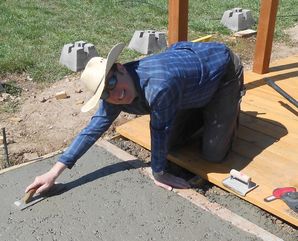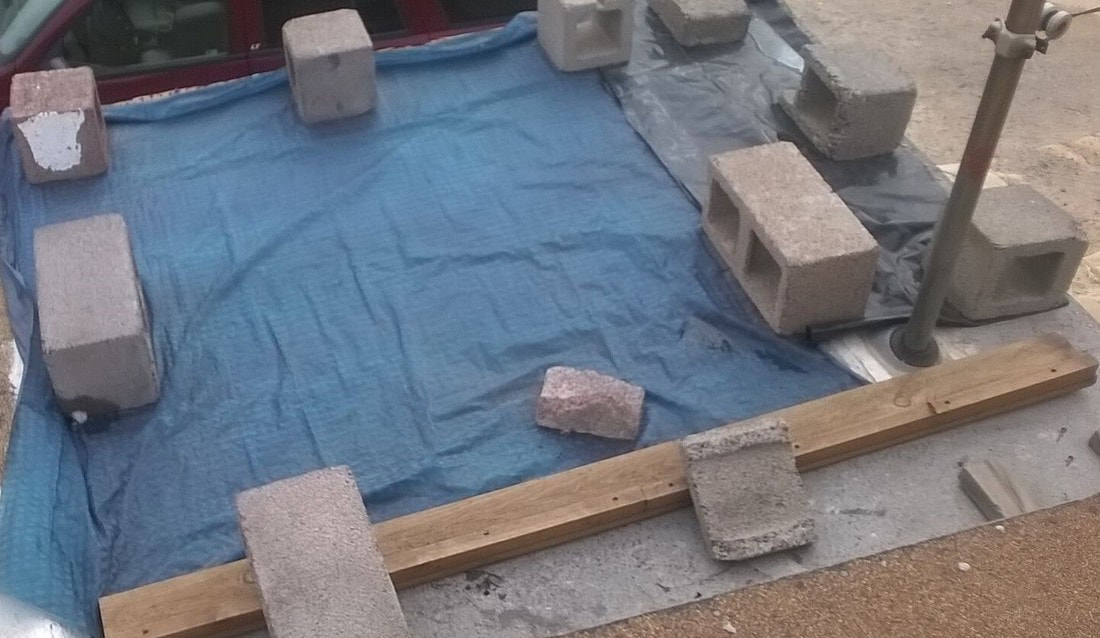|
By Joe Seidenberg Red Feather's Native Home Resource Network (NHRN) links homeowners with resources to address critical health and safety housing needs. Sometimes this is as simple as providing a referral to existing resources like assistance with an energy bill and other times it involves many hours of dedicated case management to resolve more complex health and safety repairs.
Recently, Red Feather has been assisting Jeanette Sahneyah, a Hopi Tribal elder from the Village of Shungopavi, to identify the resources needed to implement critical roofing repairs and mold mitigation on her home. To date, we have been able to develop project plans, identify contractors, secure a $7,500 grant from the USDA, and obtain an environmental health assessment from U.S. Indian Health Services. Additionally, we have another $6,000 available from Arizona Public Service to weatherize the home once the roof has been repaired. However, despite all the resources and progress amassed so far, we still need additional funds to complete the project as planned. This is why we recently launched a crowdfunding campaign to leverage the power of individual giving. We have found that private foundations generally do not fund direct housing repairs due to a preference for focusing on systemic issues of poverty and community development, such as Red Feather’s DIY Educational Programs. While addressing systemic issues is an important focus area, it also ignores the fact that many families need immediate assistance with health and safety issues in their homes. And while most tribal housing authorities are doing all they can to help, they often cannot meet the overwhelming demand for their services. Just as there is a Red Cross to help families and communities with disasters there needs to be services that are responding to emergency housing repair needs. Our hope for the sustainability of this strategy is to build a large enough network that continues to grow. If even a few people are supportive of this effort and in-turn share with their network we are moving in the right direction. Nearly one hundred Hopi tribal employees and community members came out to support their local non-profits at the first ever Hopi Gives Day event in the Village of Kykotsmovi, Arizona on Friday. Red Feather and 2 other non-profit organizations, The Hopi Foundation, and Hopi Education Endowment Fund partnered to host the event to raise awareness about their programs and an annual state-wide fundraising competition that we are participating in called Arizona Gives Day. It is exciting to see our Hopi non-profits collaborating to raise awareness and donations, said The Hopi Foundation’s Executive Director, Monica Nuvamsa. “We can do so much more when we work together”, she added. The event was held at the Kykotsmovi Community Building and included door prizes, food, music from local musician Ed Kabotie, and information from the 3 non-profits about their programs. Chairman of the Hopi Tribe, Herman Honanie, was in attendance and sent an email to all tribal government employees that day encouraging them to support their local non-profits who are participating in Arizona Gives Day. Arizona Gives Day, which falls on April 4th this year, has raised over $7.4 million for Arizona nonprofits since 2013. Arizona non-profits, which account for 325,000 jobs and nearly 10% of the state’s annual income, are competing for cash prizes totaling $175,000 this year. “We are grateful to our partners APS, Hopi Cultural Center, Hopi Kokopelli Inn, and Hopi Telecommunications for sponsoring the event,” said HEEF Executive Director LuAnn Leonard. She continued, “Non-profits, businesses, and community members all working together is a beautiful thing that strengthens our collective ability to answer the needs of our people. While Arizona Gives Day is intended to benefit Arizona non-profits, all Red Feather supporters are encouraged to participate because stronger programs serving Hopis and Navajos in Arizona will allow us to more quickly bring those programs to Tribes in other states. Red Feather realizes that many of you recently made gifts during our annual appeal. If you are able to make a gift at this time, it would be very much appreciated. If you aren’t, we understand, and ask that you please consider sharing our work with a friend so that they might become involved. Our strength is dependent upon sharing the load. You and your friends can make gifts on or before April 4th at azgives.org. You can always give to Red Feather at www.redfeather.org. Thank you! By Mark Hall  With an over 20 -year history of helping people help themselves, Red Feather has seen difficult times and has always overcome them. We have been able to sustain our programs by listening carefully to the communities we serve and leveraging the wisdom of our large family of donors, partners, board members and advisors. A new challenge presented itself when our recent annual appeal earned only half of what we were expecting. To determine our path forward, four Red Feather board members, the five Red Feather staff members, and a seasoned facilitator came together. Through those conversations, we collectively concluded that our existing assets and expected income would not support our current operating structure, and that changes were necessary to ensure the survival of the organization. Consequently, the Board and I decided to suspend operations in Montana where we have been working with the Northern Cheyenne Tribe, until funding conditions are more favorable. In agriculture, there are times when planting fewer crops is necessary to save seeds for more favorable growing conditions. A similar principle applies in organizational management – difficult prioritization decisions are often required to ensure a healthy future. It is very difficult to discontinue our programs serving the Northern Cheyenne people, and to lose a valuable member of the Red Feather team in John Marian, but we felt strongly that this was the best way to ensure our programs endure to help others, and to hasten our return to Montana. John Marian has served as Red Feather’s Education Director and Northern Plains Program Manager since 2014. He originally joined the organization in 2012 as a part-time temporary employee, hired specifically to develop our first educational curriculum, a Basic Home Maintenance college course which he successfully delivered at Chief Dull Knife College in 2013. Since that time, John has been responsible for creating all of Red Feather’s highly successful Do-It-Yourself educational programs, empowering Native Americans to address their most urgent housing needs. In addition, John has developed and delivered several other important programs with and for the Northern Cheyenne people; such as healthy home maintenance workshops for low-rent tenants, a building performance study which included several Red Feather straw bale homes and led to a major home renovation project for Northern Cheyenne elder and veteran Bilford Curley, and, most recently, a volunteer-driven Weatherization Blitz. While difficult to part ways with John, we are grateful for the time and devotion he gave to the Northern Cheyenne people and to Red Feather, and expect great things from whatever he undertakes next. We ask the Northern Cheyenne people, and all of our supporters and followers, to please be patient. We must strengthen ourselves before helping others. By focusing our remaining resources on the programs we offer to the Navajo Nation and Hopi Tribe we will grow strong enough to return to plant the seeds we have set aside. We will continue to maintain a smaller office and storage in Bozeman, and thankfully retain our Office Manager, Delisa de Vargas and our VISTA worker Ellary Kramka. We remember the Northern Cheyenne and are grateful for the faith they have shown us and the opportunities they have provided for us to become better people. It is with this in mind, that we store the seeds that will allow us to return our programs to the Northern Cheyenne people. |
Archives
June 2023
Categories
All
|
|
Change your mind at any time by clicking 'unsubscribe' in any email you receive or by contacting us at [email protected]. We will treat your information with respect. For more information about our privacy practices please see our privacy policy. By clicking above, you agree that we may process your information in accordance with these terms.
In compliance with all GDPR requirements- you can request any data you’ve shared with Red Feather to be permanently deleted from our records by contacting us at [email protected]. |
WORKING WITH HOPI AND DINÉ
COMMUNITIES FOR HEALTHIER AND SAFER HOMES.
LAND ACKNOWLEDGEMENT: The Red Feather program office sits in an area that is sacred to over 14 local tribes, including the Diné, Hopi, Havasupai, Hualapai, Zuni, Pueblo, and Kaibab-Paiute peoples. Some of these nations are represented among the Red Feather staff, and some not. We humbly acknowledge this area’s Indigenous nations, original stewards and Native descendants who will forever know this place as home. We share a responsibility to recognize and acknowledge the people, cultures, and histories that make up our community. *Adapted from the Flagstaff City Council land acknowledgement developed by the Indigenous Commission

If you have a disability that limits your ability to access our facilities, please contact us so we can arrange for an alternative meeting location. See our ADA access plan here.
This institution is an equal opportunity provider. |




 RSS Feed
RSS Feed

